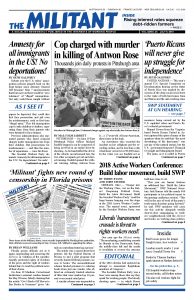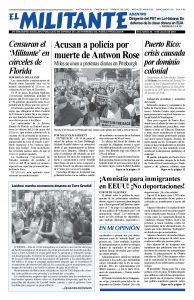NEW YORK — More than 30 years after Thomas Sankara, the leader of the popular revolution in Burkina Faso, was assassinated, his example and ideas live on. That was clear from the interest in books of his speeches, other revolutionary working-class literature and discussions at the annual Mafrika Music Festival in Harlem June 17.
Sankara was the leader of Burkina Faso’s revolutionary government from 1983 to 1987. Living in one of Africa’s poorest and least developed countries, he led workers and peasants there to take control over the former French colony and of their own lives.
On Oct. 15, 1987, Sankara and 12 of his aides and bodyguards were assassinated in a military coup led by Blaise Compaoré that served the interests of those both in France and Burkina Faso whose property and class interests were threatened by the revolutionary mobilizations.
Sponsored by Burkinabe Entertainment, the festival drew a diverse crowd of several hundred. Barbadians, Dominicans, Grenadians, Jamaicans and Puerto Ricans mixed with people from Ghana, Ivory Coast and Nigeria as well as Russia and the U.S. to partake in the excellent music and dance performances. Dozens of people originally from Burkina Faso also attended.
Many people made a beeline for the table set up by Socialist Workers Party members and supporters when they saw the piles of Thomas Sankara Speaks. They bought copies of the book in both French and English to share with family members and friends who were born or raised in the United States.
A number of people had their picture taken holding the books in front of the literature table and three large displays on Sankara and the revolution in Burkina Faso.
It wasn’t just West Africans who were interested. A Dominican worker who questioned whether a socialist revolution was possible anymore in the world got the first copy of the book. We said that the ideas and course advocated by Sankara are not just for Africa, but strengthen the struggle of working people in the United States and around the world as well.
The literature table and display on Sankara became a pole of attraction for those interested in discussing a road forward for working people and also for some sharp debates.
“The problem is that the Jews run the country and the major businesses,” one woman said. When this correspondent said that’s not true, that scapegoating Jews and promoting Jew-hatred, especially in time of crisis, is how the bosses get workers to take their eyes off the real enemy, the capitalist system, she agreed that she would “have to look into that.” She got a copy of the Militant.
The New International magazine with the article “The Second Assassination of Maurice Bishop” also drew attention. Bishop was the central leader of the 1979 workers and farmers revolution in Grenada. A man from Barbados who supported the faction of Bernard Coard — who placed Bishop under house arrest in 1983 and then killed him and other revolutionaries when they tried to stop the counterrevolutionary coup — spoke with Shirelynn George, who participated in the revolution. He said that Ronald Reagan destroyed the revolution by sending U.S. troops to occupy the island. George replied that was only possible after Bishop was murdered and a 24-hour curfew imposed on the entire population, bringing down the revolution.
Both Sankara and Bishop were close allies of Fidel Castro and the Cuban Revolution, and there was keen interest in books on Cuba.
Festivalgoers picked up 17 copies of Sankara Speaks, two copies of Malcolm X, Black Liberation, and the Road to Workers Power by SWP National Secretary Jack Barnes, eight other books, including several on the Cuban Revolution, two subscriptions and 16 single copies of the Militant. More than a dozen people signed up to learn more about the Socialist Workers Party and its activities.

